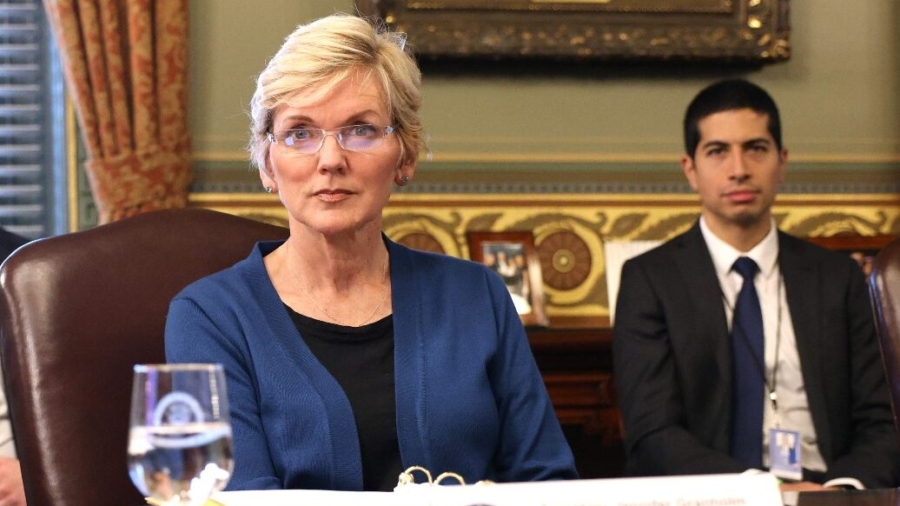A new House Republican measure could force the U.S. energy secretary to disclose any meetings with interest groups connected to the Chinese communist regime.
On Tuesday, Rep. Bill Huizenga (R-Mich.) introduced legislation that would require the energy secretary to “disclose stakeholder meetings with entities that have ties to China, produced studies regarding or advocated for policy that limit, restrict, or ban the use of any type of energy, and have applied for or received Federal funds.”
Huizenga offered the legislation as an amendment to the “Save Our Gas Stoves Act,” a bill sponsored by Rep. Debra Lesko (R-Ariz.) and intended to limit the government’s ability to limit access to gas stoves. Huizenga’s amendment was adopted Tuesday.
“The American people deserve to know if groups with ties to the CCP are influencing the Biden Administration’s energy policy! I am glad my amendment to increase transparency on Energy Secretary Jennifer Granholm was adopted to [Lesko’s] Save Our Stoves Act!” Huizenga said following the amendment vote.
The “Save Our Gas Stoves” Act still has to go to a vote in the Republican-controlled House. It then goes to the Democrat-controlled Senate and, if passed, to President Joe Biden’s desk, where he may either sign or veto the legislation.
2021 Meeting with CCP-Linked Group
Huizenga has previously called attention to meetings between Energy Secretary Jennifer Granholm and the Rocky Mountain Institute (RMI), a Colorado-based nonprofit group that advocates for the adoption of more sustainable energy sources and products. RMI also helped produce a study last year attributing up to 12.7 percent of childhood asthma cases to gas stove use in the home.
RMI’s only overseas office is located in China’s capital city of Beijing. The group has consulted with the ruling Chinese Communist Party (CCP) on efforts to transition away from fossil fuels.
“As an independent global non-profit, RMI has worked with and alongside governments around the world for four decades to accelerate the adoption of market-based solutions that cost-effectively bring about a clean energy transition,” an RMI spokesperson told NTD News in February.
“We aim to work with any entity accelerating the transition to a zero-carbon future and securing its benefits for all. We share our research and analysis routinely with governments, policymakers of both parties, fellow non-profit organizations and corporations, including those in the fossil fuel business.”
In February, a Freedom of Information Act (FOIA) disclosure revealed a June 2021 meeting between Granholm and RMI CEO Jules Kortenhorst.
Huizenga called attention to the meeting between Granholm and Kortenhorst in light of growing debate about federal gas stove regulations, but a Department of Energy spokesperson insisted that the 2021 meeting wasn’t about home appliances.
“The June 2021 meeting with CEOs of American chemical, energy, transportation and electrical companies wasn’t about appliances, it was to build support for the now enacted $1 trillion Bipartisan Infrastructure Law, which is creating thousands of jobs across red and blue states alike,” the Energy Department spokesperson told Fox News at the time.
Gas Stove Legislation
Much of the concern over new federal regulations on gas stoves came about after a December interview in which Consumer Product Safety Commission (CPSC) Commissioner Richard Trumka Jr. floated the prospect of a ban on gas stoves if they couldn’t be made safe.
In a leaked October 2022 memo, Trumka also said, “There is sufficient information available for CPSC to issue [a notice of proposed rulemaking] in [fiscal year] 2023 proposing to ban gas stoves in homes.”
Trumka’s talk of gas stove bans prompted criticism from numerous Republican lawmakers and some Democrats. Trumka later insisted any gas stove regulations would apply only to new products. CPSC Chair Alexander Hoehn-Saric said, “I am not looking to ban gas stoves and the CPSC has no proceeding to do so.”
Despite official claims that existing gas stoves are not at risk of a ban, lawmakers have been wary of new regulations going forward. The “Save Our Gas Stoves Act” is one of several Republican-sponsored bills to constrain the government from regulating American’s choice of stoves.
On Tuesday, the House passed a different bill limiting the power to regulate gas stoves—the “Gas Stove Protection and Freedom Act.” While the “Save Our Gas Stoves Act” constrains the Energy Department, the “Gas Stove Protection and Freedom Act” constrains the CPSC’s rulemaking ability.
The “Gas Stove Protection and Freedom Act” passed by a vote of 248 to 180. Support for the bill came from 219 House Republicans and 29 House Democrats.

